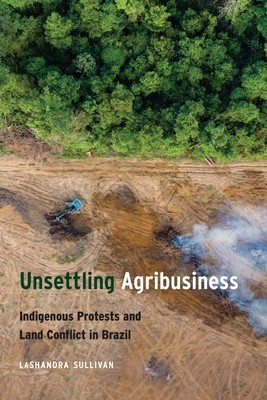
- We will send in 10–14 business days.
- Author: Lashandra Sullivan
- Publisher: University of Nebraska Press
- ISBN-10: 1496208382
- ISBN-13: 9781496208385
- Format: 15.2 x 22.9 x 1.8 cm, hardcover
- Language: English
- SAVE -10% with code: EXTRA
Reviews
Description
In the last half century Brazil's rural economy has developed profitable soy and sugarcane plantations, causing mass displacement of rural inhabitants, deforestation, casualization of labor, and reorganization of politics. Since the early 2000s Indigenous peoples have protested the taking of their land and transformed terms provided by state institutions, NGOs, agribusiness firms, and myriad local middlemen toward their material survival, leading to significant violence from third-party security forces. Guarani protestors have confronted these armed security forces through a form of life-or-death political theater and spectacle on the sides of highways, while squatters have viscerally disturbed the landscape and enlivened long-standing genocide and settler-colonial violence.
In Unsettling Agribusiness LaShandra Sullivan analyzes the transformations in rural life wrought by the internationalization of agribusiness and contests over land rights by Indigenous social movements. The protest camps, by reclaiming the countryside as a site of residence and not merely one of abstract maximized agribusiness production, call into question the meanings and stakes of Brazil's political model. The squatter protests complicated federal attempts to balance land reform with economic development imperatives and imperiled existing constellations of political and economic order. Unsettling Agribusiness encompasses the multiple scales of the conflict, maintaining within the same frame of analysis the unique operations of daily life in the protest camps and the larger political, economic, and social networks of pan-Indigenous activism and transnational agribusiness complexes of which they are a part. Sullivan speaks to the urgent need to link the dual preoccupations of multi-scalar political-economic change and the ethno-racial terms in which Indigenous people in Brazil live today.EXTRA 10 % discount with code: EXTRA
The promotion ends in 17d.14:13:46
The discount code is valid when purchasing from 10 €. Discounts do not stack.
- Author: Lashandra Sullivan
- Publisher: University of Nebraska Press
- ISBN-10: 1496208382
- ISBN-13: 9781496208385
- Format: 15.2 x 22.9 x 1.8 cm, hardcover
- Language: English English
In the last half century Brazil's rural economy has developed profitable soy and sugarcane plantations, causing mass displacement of rural inhabitants, deforestation, casualization of labor, and reorganization of politics. Since the early 2000s Indigenous peoples have protested the taking of their land and transformed terms provided by state institutions, NGOs, agribusiness firms, and myriad local middlemen toward their material survival, leading to significant violence from third-party security forces. Guarani protestors have confronted these armed security forces through a form of life-or-death political theater and spectacle on the sides of highways, while squatters have viscerally disturbed the landscape and enlivened long-standing genocide and settler-colonial violence.
In Unsettling Agribusiness LaShandra Sullivan analyzes the transformations in rural life wrought by the internationalization of agribusiness and contests over land rights by Indigenous social movements. The protest camps, by reclaiming the countryside as a site of residence and not merely one of abstract maximized agribusiness production, call into question the meanings and stakes of Brazil's political model. The squatter protests complicated federal attempts to balance land reform with economic development imperatives and imperiled existing constellations of political and economic order. Unsettling Agribusiness encompasses the multiple scales of the conflict, maintaining within the same frame of analysis the unique operations of daily life in the protest camps and the larger political, economic, and social networks of pan-Indigenous activism and transnational agribusiness complexes of which they are a part. Sullivan speaks to the urgent need to link the dual preoccupations of multi-scalar political-economic change and the ethno-racial terms in which Indigenous people in Brazil live today.

Reviews